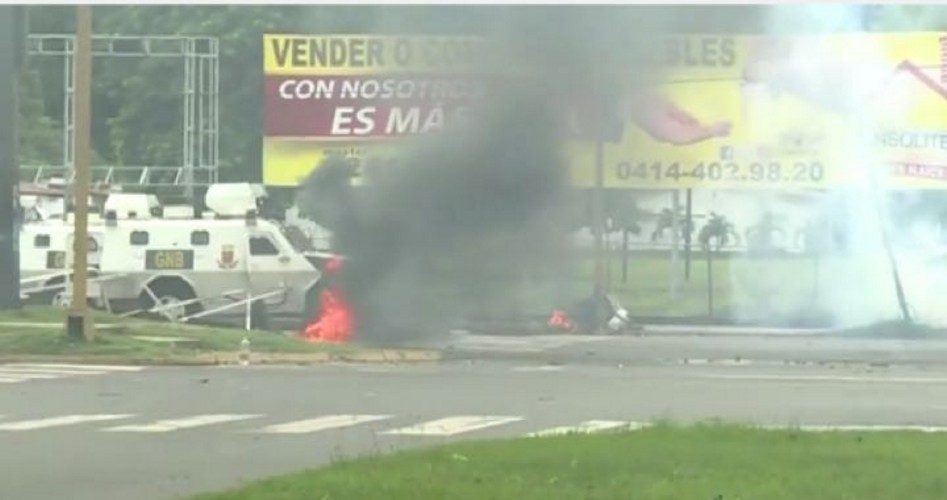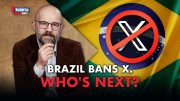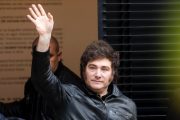
A pre-dawn raid on Sunday by about 20 military and civilian personnel against Maduro’s Fort of Paramacay near Valencia (two hours east of Caracas) began at the same time a video appeared on social media. That video explained that the attack wasn’t intended to be a coup but an invitation to Maduro’s troops to defect and join them in rebellion against the Marxist dictator:
This is not a coup d’état. This is a civic and military action to re-establish constitutional order. But more than that, it is to save the country from total destruction.
The action came one day after Maduro’s new National Constituent Assembly was sworn in.
The attack was rebuffed but not before several members of the raiding party escaped with an estimated 120 battle rifles, ammunition, and grenades.
A spokesman for Maduro said that his troops had killed two of the intruders, while a posting by the leader of the raiders said that only one of them was injured and seven were captured, while 10 got away with the weapons.
In his weekly televised show, Maduro called the attackers “mercenaries” in the pay of the “empire” (the United States) and that “those who escaped are being actively searched for, and we are going to capture them.”
Reports of simultaneous attacks on other military installations under the control of Maduro were unconfirmed.
The leader of the group appeared to be Juan Carlos Caquaripano, a former National Guard captain who had tried to foment a rebellion by Maduro’s forces three years ago.
In an interview aired on Saturday, White House national security advisor H.R. McMaster denied any American plans to intervene militarily in Venezuela. When host Hugh Hewitt asked McMaster whether the Trump administration was considering “pulling a Panama” — a reference to what President George H. W. Bush did in order to oust Panama’s Manuel Noriega in 1989 — McMaster responded: “You know, there’s a long history in the region of American intervention, and that’s caused problems in the past,” adding:
We don’t want to give his regime, or others, the opportunity to say, ‘This is the Yankees doing this … [that] they are the cause of the problem.’
It’s important for us to place responsibility for this catastrophe on Maduro’s shoulders. He’s the one who caused it, and he’s the one who’s perpetuating it.
McMaster said nothing about the Cuban involvement in Venezuela dating back nearly two decades.
In commenting on the perceived failure of Sunday morning’s attempt to spark a rebellion among Maduro’s troops at the Fort of Paramacay, Anatoly Kurmanaev, writing in Sunday’s Wall Street Journal touched on the Cuban presence in Venezuela:
Former president Hugo Chavez … purged the arm of any dissidents many times and worked to ensure ideological loyalty from senior leadership.
Cuba’s formidable security services have also had a big presence in Venezuela for years.
The same day, Mary Anastasia O’Grady expanded on that Cuban “presence” in her editorial that also appeared in the Wall Street Journal. O’Grady has been writing editorials on Latin American affairs for the paper for two decades while serving on the board of the libertarian think-tank Liberty Fund. She wrote:
The Cuba-controlled military regime put tanks in the streets and unleashed a hunt for the fleeing soldiers. It claims that it put down the rebellion and it instructed all television to broadcast only news of calm….
Any U.S.-led international strategy to liberate Venezuela must begin with the explicit recognition that Cuba is calling the shots in Caracas, and that Havana’s control of the oil nation is part of its wider regional strategy….
The Castro infiltration began over a decade ago when Fidel sent thousands of Cuban agents, designated as teachers and medical personnel, to spread propaganda and establish communist cells in the [neighborhoods].
And what is Cuba’s long-range strategy? O’Grady calls it a “historical political project” that aims to establish Cuban-type regimes all across South America. So far they have successfully infiltrated Nicaragua, Bolivia, Ecuador, and are going after Columbia.
Small short-lived skirmishes such as the one near Valencia early Sunday morning are doomed to failure until the Cuban influence in Venezuela, both military and financial, is recognized and dealt with successfully.
Image: Screenshot of AFP video of incident
An Ivy League graduate and former investment advisor, Bob is a regular contributor to The New American magazine and blogs frequently at LightFromTheRight.com, primarily on economics and politics. He can be reached at [email protected].
Related articles:
U.S.-imposed Sanctions to Squeeze Venezuela’s Marxist Dictator
Sunday’s Phony Election in Venezuela Installs Marxist Dictatorship



